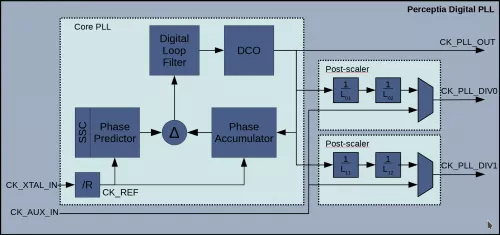Perceptia’s DeepSub™ pPLL03F is a family of all digital PLLs featuring low-jitter and compact area suitable for clocking applications with critical timing requirements at frequencies up to 4GHz. It is suitable as a clock source for performance computing blocks and ADCs/DACs with moderate SNR requirements.
Perceptia’s second generation pPLL03F family is available on technologies from 5nm to 40nm and across multiple foundry partners. We are continually expanding the range of technologies where it is silicon proven and can quickly port it to other technologies or foundries upon request.
To give SoC designers the maximum flexibility in building complex multi-domain clock systems, pPLL03F is very small (< 0.005 sq mm) and low power (< 2.1mW in GF 22FDX). It is well suited to applications with many clock domains where each is driven by their own PLL. To simplify system design, PLL03 has an integrated power supply regulator which allows multiple instances of PLL03 to share common power supplies. Alternatively instances of pPLL03 can share supplies with the blocks that use its output clock.
pPLL03 integrates easily into any SoC design and includes all the views and models required by modern back end flows.
The pPLL03F is built using Perceptia’s second generation all digital PLL technology. This robust technology delivers identical performance across many processes, regardless of PVT conditions. It consumes a small fraction of the area of an analog PLL whilst maintaining comparable performance.
pPLL03F can be used as an integer-N PLL or as a fractional-N PLL. The fractional-N mode provides a high flexibility to choose the best combination of input and output clock frequencies at the system level.
Perceptia further provides integration support and offers customization and migration services.
Fractional-N PLLs for Performance Computing
Overview
Key Features
- Low jitter, suitable for many clocking applications, including high speed digital, ADC, DAC, medium-speed PHY
- Extremely small die area (< 0.005 sq mm), using a ring oscillator
- Output frequency can be from 1 to 400 times the input reference, up to 4GHz
- Reference clock from 10MHz to 500MHz
- Second-generation digital PLL architecture, providing integer and fractional multiplication
- Two PLL outputs via separate postscalers
- Post-scalers programmable from 1 to 2,040
- Lock-detect output
- Can generate a spread-spectrum clock from a clean reference
- Oscillator output duty cycle better than 48 / 52% on CK_PLL_OUT0 and CK_PLL_OUT1
- Highly testable using industry standard flows
- ATPG vectors provided
- Specification of functional tests to supplement ATPG testing
- Industrial operating conditions (-40 to 85°C) with junction temperature up to 100°C
Benefits
- Fractional multiplication with frequency up to 5GHz (12nm and below) or 5GHz (16nm and above)
- Low jitter (< 10ps RMS)
- Small size (< 0.005 sq mm)
- Low Power (< 2.1mW in GF 22FDX)
- Support for multi-PLL systems with tens of PLLs per SoC
- Easy integration
Block Diagram

Applications
- Performance Computing
- Complex SoCs with many clock domains
- Low-jitter applications
- Moderate SNR ADC/DAC
Deliverables
- Datasheet
- Detailed Verilog behavioral model
- Timing models
- LEF5.6 abstract for floor planning/chip assembly
- Integration Guide
- DFT Guide
- Integration support
- Characterization report
- GDSII layout macrocell
- CDL netlist for LVS
- DRC, LVS and SI verification reports
- Netlist model with accompanying documentation allowing integration of the module in scan chains
Technical Specifications
Short description
Fractional-N PLLs for Performance Computing
Vendor
Vendor Name
Foundry, Node
Portable to all CMOS processes 65nm and smaller. See specific product listings
Maturity
Silicon Proven
Availability
Depends on process - please ask
GLOBALFOUNDRIES
Pre-Silicon:
12nm
,
14nm
,
14nm
LPE
,
14nm
LPP
,
20nm
LPM
,
28nm
,
28nm
FDSOI
,
28nm
HPP
,
28nm
LPH
,
28nm
SLP
,
32nm
,
40nm
LP
,
55nm
,
55nm
LPX
,
65nm
,
65nm
LP
,
65nm
LPe
SMIC
Pre-Silicon:
14nm
,
28nm
,
28nm
HK
,
28nm
HKC+
,
28nm
PS
,
40nm
LL
,
55nm
G
,
55nm
LL
,
65nm
LL
Samsung
Pre-Silicon:
10nm
,
28nm
FDS
,
28nm
LPH
,
28nm
LPP
,
32nm
LP
,
45nm
LP
,
65nm
LP
TSMC
Pre-Silicon:
5nm
,
10nm
,
12nm
,
16nm
,
20nm
,
22nm
,
28nm
,
28nm
HP
,
28nm
HPC
,
28nm
HPCP
,
28nm
HPL
,
28nm
HPM
,
28nm
LP
,
40nm
G
,
40nm
LP
,
45nm
GS
,
45nm
LP
,
55nm
FL
,
55nm
G
,
55nm
GP
,
55nm
LP
,
55nm
NF
,
55nm
ULP
,
55nm
ULPEF
,
55nm
UP
,
65nm
G
,
65nm
GP
,
65nm
LP
UMC
Pre-Silicon:
14nm
,
28nm
,
28nm
HLP
,
28nm
HPC
,
28nm
HPM
,
28nm
LP
,
55nm
,
65nm
LL
,
65nm
LP
,
65nm
SP
Related IPs
- High Performance Fractional-N RF Frequency Synthesizer PLLs for 5G, WiFi, etc
- General Purpose Fractional-N PLLs
- Fractional-N PLL for Performance Computing in GlobalFoundries 22FDX
- Fractional-N PLL for Performance Computing in GlobalFoundries 12LPP/14LPP
- Fractional-N PLL for Performance Computing in Samsung 8LPP
- Fractional-N PLL for Performance Computing in Samsung 14LPP